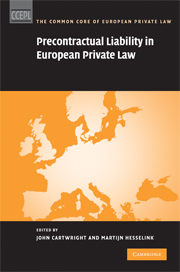Book contents
- Frontmatter
- Contents
- General editors' preface
- Preface
- List of contributors
- Abbreviations
- Note on translations of foreign language statutory provisions
- 1 Introduction
- 2 Case studies
- Case 1 Negotiations for premises for a bookshop
- Case 2 Negotiations for renewal of a lease
- Case 3 Mistake about ownership of land to be sold
- Case 4 An architect's preparatory work for a contract which does not materialise; parallel negotiations
- Case 5 A broken engagement
- Case 6 An express lock-out agreement
- Case 7 Breakdown of merger negotiations
- Case 8 A shopping centre without a tenant
- Case 9 Breakdown of negotiations to build a house for a friend
- Case 10 Public bidding
- Case 11 A contract for the sale of a house which fails for lack of formality
- Case 12 Confidential design information given during negotiations
- Case 13 Misrepresentation or silence about a harvester's capacity
- 3 From the common law to the civil law: the experience of Israel
- 4 A law and economics perspective on precontractual liability
- 5 Conclusions
- Bibliography
- Index
Case 7 - Breakdown of merger negotiations
Published online by Cambridge University Press: 10 August 2009
- Frontmatter
- Contents
- General editors' preface
- Preface
- List of contributors
- Abbreviations
- Note on translations of foreign language statutory provisions
- 1 Introduction
- 2 Case studies
- Case 1 Negotiations for premises for a bookshop
- Case 2 Negotiations for renewal of a lease
- Case 3 Mistake about ownership of land to be sold
- Case 4 An architect's preparatory work for a contract which does not materialise; parallel negotiations
- Case 5 A broken engagement
- Case 6 An express lock-out agreement
- Case 7 Breakdown of merger negotiations
- Case 8 A shopping centre without a tenant
- Case 9 Breakdown of negotiations to build a house for a friend
- Case 10 Public bidding
- Case 11 A contract for the sale of a house which fails for lack of formality
- Case 12 Confidential design information given during negotiations
- Case 13 Misrepresentation or silence about a harvester's capacity
- 3 From the common law to the civil law: the experience of Israel
- 4 A law and economics perspective on precontractual liability
- 5 Conclusions
- Bibliography
- Index
Summary
Case 7
A and B, both major firms of accountants, negotiate with a view to the merger of their firms. A breaks off the negotiations.
There are three separate situations to consider:
A breaks off the negotiations after three years of very intense negotiations in which both parties have incurred considerable expenses, but where the parties recognise that they have not yet reached agreement on all major points and A has not made any statement to B that it is convinced that they will reach final agreement.
A breaks off the negotiations quite soon after their beginning, but after the parties have reached agreement on all major points, and only a few minor points remain to be settled. A has not made any statement to B that it is convinced that they will reach final agreement. B has already incurred legal expenses.
A breaks off the negotiations when the parties have not yet reached agreement on all major points but A has more than once made statements to B that it is convinced that they will reach final agreement. B has already incurred legal expenses.
What liability (in contract, tort, restitution, or any other form of liability), if any, does A have to B in each of these situations if A gives no reason for breaking off the negotiations? Would it make a difference if it (honestly) gives as the reason for breaking off the negotiations:
it has received a better offer from C for a merger of A's firm with C's firm;
[…]
- Type
- Chapter
- Information
- Precontractual Liability in European Private Law , pp. 192 - 232Publisher: Cambridge University PressPrint publication year: 2009



